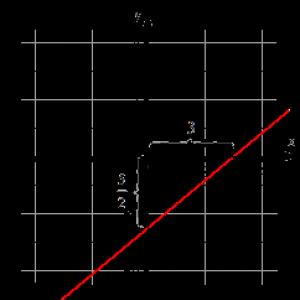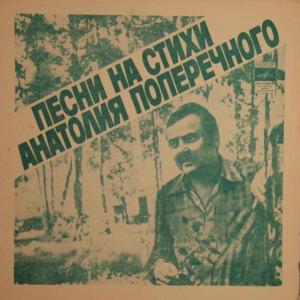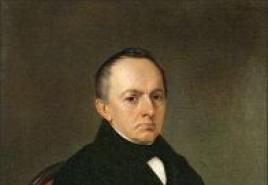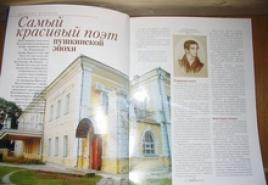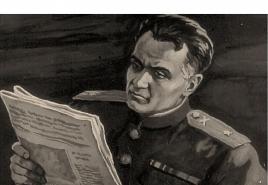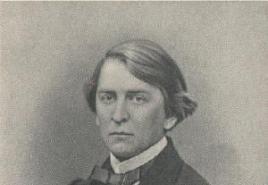Biography of the main stages of the life and work of Batyushkov. Batyushkov Konstantin - biography, facts from life, photos, background information Batyushkov's works
Konstantin Nikolaevich Batyushkov(May 18 (29), 1787, Vologda - June 7 (19), 1855, Vologda) - Russian poet, predecessor of Pushkin.
He came from an ancient noble family, father - Nikolai Lvovich Batyushkov. (1753-1817). He spent the years of his childhood in the family estate - the village of Danilovskoye. At the age of seven, he lost his mother, who suffered from mental illness, which was inherited by Batyushkov and his older sister Alexandra.
In 1797 he was sent to the St. Petersburg boarding school Zhakino, where the future poet studies European languages, reads European classics with rapture and begins to write his first poems. In 1801 he moved to the boarding house of Tripoli. In the sixteenth year of his life (1802), Batyushkov left the boarding school and began reading Russian and French literature. At the same time, he became close friends with his uncle, the famous Mikhail Nikitich Muravyov. Under his influence, he began to study the literature of the ancient classical world and became an admirer of Tibull and Horace, whom he imitated in his first works. In addition, under the influence of Muravyov, Batyushkov developed a literary taste and aesthetic flair.
In 1802, Batyushkov was enrolled in the service of the Ministry of Public Education. This service burdens the poet, but circumstances do not allow him to leave the service. The old noble family of the Batyushkovs became impoverished, the estate fell into decay. Batyushkov did not have high-ranking patrons and patrons who visited many writers, poets, artists, musicians, and, perhaps because of pride, did not want to have: “I will not ask and bow in St. Petersburg as long as I have a piece of bread ". Subsequently, the poet will say, opposing himself to many obsequious piites of that time: "I wrote about independence in verse, about freedom in verse."
In St. Petersburg, Batyushkov met representatives of the then literary world. He became especially close friends with G. R. Derzhavin, N. A. Lvov, V. V. Kapnist, A. N. Olenin, and N. I. Gnedich. In 1805, his poem "Message to My Poems" was published in the Novosti Literature magazine - Batyushkov's first appearance in print. Having entered the department of the Ministry of Public Education, Batyushkov became close to some of his colleagues who joined the Karamzin direction and founded the "Free Society of Russian Literature Lovers".
In 1807, Batyushkov signed up for the people's militia (militia) and took part in the Prussian campaign. In the battle of Heilsbergomon he was wounded and had to go to Riga for treatment. During the campaign, he wrote several poems, and began the translation of the poem Tassa Liberated Jerusalem. The following year, 1808, Batyushkov took part in the war with Sweden, after which he retired and went to his relatives, in the village of Khantonovo, Novgorod province. In the village, he soon began to get bored and rushed to the city: his susceptibility became almost painful, more and more he was seized by spleen and a premonition of future madness.
At the very end of 1809, Batyushkov arrived in Moscow and soon, thanks to his talent, bright mind and kind heart, he found good friends in the best areas of the then Moscow society. Of the local writers, he became closest to V. L. Pushkin, V. A. Zhukovsky, P. A. Vyazemsky and N. M. Karamzin. The years 1810 and 1811 passed for Batyushkov partly in Moscow, where he enjoyed his time, and partly in Khantonov, where he was moping. Finally, having received a resignation from military service, at the beginning of 1812 he went to St. Petersburg and, with the help of Olenin, entered the service of the Public Library; his life settled down quite well, although he was constantly disturbed by the thought of the fate of his family and himself: an early promotion could not be expected, and economic affairs were going from bad to worse.
In 1809, the poet takes part in a campaign against the Aland Islands. At the beginning of the summer, he gets a vacation, after a short stay in St. Petersburg, he goes to the Khantonovo estate, where, among other things, he writes a poetic pamphlet "Vision on the banks of Leta", which sold out in lists and was printed in a distorted form only thirty-two years after its creation. One of the lists of the poem, which is a small satirical poem, was called "The Last Judgment of the Russian Piites, or Leading on the Banks of the Leta to Hypotas de Rotti." This pamphlet was picked up by all advanced Russia, the name of Batyushkov as a poet is becoming well known in Russia. The Shishkovists ridiculed by him raged, the poet hit not in the eyebrow, in the eye! The sentimentalists, who, with the exception of Karamzin, who is highly revered as a poet, could not be delighted with the Vision, were also ridiculed.
Since December 1809 the poet has been living in Moscow. He intends to retire, serve in a diplomatic mission, dreams of traveling around Europe. In Moscow in 1810, Batyushkov met Karamzin, and entered the circle of writers close to him. Having received his resignation with the rank of second lieutenant and living either in Moscow or on his estate in Khantonov, the poet writes a lot in poetry and prose, and translates.
At the beginning of 1812, Batyushkov moved to St. Petersburg, and in April of the same year entered the Public Library as an assistant curator of manuscripts. The director of the library was Alexei Olenin, a writer-archaeologist, artist and connoisseur of the arts, in whose house there was a salon visited by many writers and artists with whom Batyushkov met. Colleagues in the Public Library were Gnedich and Krylov.
The outbreak of the Patriotic War of 1812 strengthens the patriotic feeling in the poet's soul. He wants to go to war, but illness, a strong fever, prevents him from immediately realizing this intention. Almost on the eve of the Battle of Borodisk, the poet takes a vacation and comes to Moscow in order to accompany the widow of his mentor E. F. Muravyova and her family to Nizhny Novgorod. The confluence of refugees and national disasters, seen by the poet on the way from Moscow, make a strong impression on him. Batyushkov returns to Moscow after the expulsion of the French from it.
In 1813, Batyushkov, as soon as his state of health allowed, left for Dresden, to the main apartment of the army in the field. Batyushkov is now General Raevsky's adjutant. In the battle near Leipzig, Batyushkov's friend, sung in his poems, I. A. Petin, dies, and Raevsky is wounded. In 1814, the poet takes part in the crossing of the Rhine and entry into France. From Paris, whose capitulation Batyushkov witnessed, he returned to St. Petersburg via England, Sweden and Finland.
The unsuccessful attempt to marry in 1815, the disorder of personal relations with his father, were hard for the poet. For some time he lives in Ukraine, in Kamenetz-Podolsk, with his military authorities. The poet is elected in absentia as a member of the Arzamas literary society. At this time, Batyushkov is experiencing a strong creative upsurge: in a year he writes twelve poetic and eight prose works. He prepares his works in verse and prose for publication.
After arriving in Moscow, the poet is elected a member of the Moscow Society of Lovers of Literature. At the entrance to it, one reads "Speech on the influence of light poetry on the language", a historical and theoretical and literary article published in the "Proceedings" of the society. Batyushkov is elected an honorary member of the Free Society of Lovers of Literature. The poet takes part in the meetings of Arzamas. In October 1817, "Experiments in Poetry and Prose" was published, which Gnedich then published. The book was well received by critics and readers.
After trips to the village with the intention of saving the estate of his father, who died in 1817, from sale at a public auction, after a stay in St. Petersburg, in the spring of 1818, the poet went south to improve his health. On the advice of Zhukovsky, Batyushkov applies for enrollment in one of the missions in Italy. In Odessa, the poet receives a letter from Alexander Turgenev announcing the poet's appointment to the diplomatic service in Naples. After a long journey, he arrives at the place of duty, with vivid impressions of the trip. Important for the poet was a meeting with Russian artists, including Sylvester Shchedrin and Orest Kiprensky, who lived at that time in Rome.
Having received leave for treatment at the end of 1820, Batyushkov travels to Rome, and then, the very next year, to the waters in Teplitz, where he learns that an anonymous poem “B ... c from Rome” appeared in “Son of the Fatherland”, written from Batyushkov's face and accepted by readers as his work, although Pletnev was its author. Batyushkov takes this as a personal insult.
By 1821, hypochondria took such proportions that the poet had to leave the service and Italy.
In 1822, the mental disorder expressed itself quite definitely, and since then Batyushkov suffered for 34 years, almost never regaining consciousness, and finally died of typhus on July 7, 1855 in Vologda; buried in the Spaso-Prilutsky Monastery, five versts from Vologda. Back in 1815, Batyushkov wrote the following words about himself to Zhukovsky: “From birth, I had a black spot on my soul, which grew, grew over the years and almost blackened my whole soul.”
(1787-1855), Russian poet. The head of the anacreontic trend in Russian lyrics ("Merry Hour", "My Penates", "Bacchae"). Later he experienced a spiritual crisis ("Hope", "To a friend"); in the genre of elegy - motifs of unrequited love ("Separation", "My Genius"), high tragedy ("Dying Tass", "Melchizedek's Saying").
BATYUSHKOV Konstantin Nikolaevich, Russian poet.
Childhood and youth. Service start
Born into an old but impoverished noble family. Batyushkov's childhood was overshadowed by the death of his mother (1795) from hereditary mental illness. In 1797-1802 he studied at private boarding schools in St. Petersburg. From the end of 1802, Batyushkov served in the Ministry of Public Education under the leadership of M. N. Muravyov, a poet and thinker who had a profound influence on him. When war was declared against Napoleon, Batyushkov joined the militia (1807) and took part in a campaign in Prussia (he was seriously wounded near Heilsberg). In 1808 he took part in the Swedish campaign. In 1809 he retired and settled in his estate Khantonovo Novgorod province.
The beginning of literary activity
Batyushkov's literary activity begins in 1805-06 with the publication of a number of poems in the journals of the Free Society of Lovers of Literature, Sciences and Arts. At the same time, he draws closer to the writers and artists who were grouped around A. N. Olenin (N. I. Gnedich, I. A. Krylov, O. A. Kiprensky and others). The Oleninsky circle, which set itself the task of resurrecting the ancient ideal of beauty on the basis of the latest sensibility, opposed itself both to the Slavic archaism of the Shishkovists (see A.V. Shishkov), and the French orientation and the cult of knick-knacks common among Karamzinists. Batyushkov's satire "Vision on the banks of the Leta" (1809), directed against both camps, becomes the literary manifesto of the circle. In the same years, he began to translate T. Tasso's poem "Jerusalem Liberated", entering into a kind of creative competition with Gnedich, who translated Homer's Iliad.
"Russian Guys"
Batyushkov's literary position undergoes some changes in 1809-10, when he draws closer in Moscow to the circle of younger Karamzinists (P. A. Vyazemsky, V. A. Zhukovsky), gets acquainted with N. M. Karamzin himself. Poems of 1809-12, including translations and imitations of E. Parny, Tibullu, a cycle of friendly messages ("My Penates", "To Zhukovsky") form the image of the "Russian Guy" - an Epicurean poet, singer, that determines all further Batyushkov's reputation laziness and lust. In 1813, he wrote (with the participation of A. E. Izmailov) one of the most famous literary and polemical works of Karamzinism, The Singer or Singers in the Conversation of the Slavic Russians, directed against the Conversations of Lovers of the Russian Word.
fracture
In April 1812, Batyushkov entered the St. Petersburg Public Library as an assistant curator of manuscripts. However, the outbreak of war with Napoleon prompts him to return to military service. In the spring of 1813 he went to Germany to the active army and reached Paris. In 1816 he retired.
Military upheavals, as well as the unhappy love experienced during these years for the pupil of the Olenins A.F. Furman, lead to a profound change in Batyushkov's worldview. The place of the "small philosophy" of Epicureanism and worldly pleasures is occupied by conviction in the tragedy of being, which finds its only solution in the poet's faith in the afterlife reward and the providential meaning of history. A new complex of moods permeates many of Batyushkov's poems of these years ("Hope", "To a Friend", "Shadow of a Friend") and a number of prose experiments. At the same time, his best love elegies dedicated to Furman were created - "My Genius", "Separation", "Tavrida", "Awakening". In 1815, Batyushkov was admitted to Arzamas (under the name Achilles, associated with his former merits in the fight against archaists; the nickname often turned into a pun, playing on Batyushkov’s frequent illnesses: “Ah, sickly”), but disappointed in literary controversy, the poet did not played an important role in society.
"Experiments in verse and prose". Translations
In 1817 Batyushkov completed a cycle of translations "From the Greek Anthology". In the same year, the two-volume edition "Experiments in Poetry and Prose" was published, in which Batyushkov's most significant works were collected, including the monumental historical elegies "Hesiod and Omir, Rivals" (an alteration of the elegy by Ch. Milvois) and "The Dying Tass ", as well as prose writings: literary and artistic criticism, travel essays, moralizing articles. "Experiments ..." strengthened Batyushkov's reputation as one of the leading Russian poets. The reviews noted the classical harmony of Batyushkov's lyrics, which related Russian poetry to the muse of southern Europe, primarily Italy and Greco-Roman antiquity. Batyushkov also owns one of the first Russian translations by J. Byron (1820).
 Mental crisis. Last verses
Mental crisis. Last verses
In 1818 Batyushkov was appointed to the Russian diplomatic mission in Naples. A trip to Italy was a long-term dream of the poet, but the heavy impressions of the Neapolitan revolution, service conflicts, and a sense of loneliness lead him to an increase in mental crisis. At the end of 1820, he seeks a transfer to Rome, and in 1821 he goes to the waters in Bohemia and Germany. The works of these years - the cycle "Imitation of the Ancients", the poem "You are awakening, O Baia, from the tomb ...", the translation of a fragment from "The Messinian Bride" by F. Schiller are marked by increasing pessimism, the conviction that beauty is doomed in the face of death and the ultimate unjustification of the earthly existence. These motives culminated in a kind of poetic testament of Batyushkov - the poem "Do you know what he said, / saying goodbye to life, gray-haired Melchizedek?" (1824).
Disease
At the end of 1821, Batyushkov developed symptoms of hereditary mental illness. In 1822 he went to the Crimea, where the disease worsened. After several suicide attempts, he is placed in a psychiatric hospital in the German city of Sonnestein, from where he is discharged for complete incurability (1828). In 1828-33 he lived in Moscow, then until his death in Vologda under the supervision of his nephew G. A. Grevens.
Russian poet. The head of the anacreotic trend in Russian lyrics ("Merry Hour", "My penates", "Bacchante"). Later he experienced a spiritual crisis ("Hope", "To a friend"); in the genre of elegy - motifs of unrequited love ("Separation", "My Genius"), high tragedy ("Dying Tass", "Melchizedek's Saying").
Biography
Born on May 18 (29 n.s.) in Vologda in a well-born noble family. Childhood years were spent in the family estate - the village of Danilovsky, Tver province. Home education was led by the grandfather, marshal of the nobility of the Ustyuzhensky district.
From the age of ten, Batyushkov studied in St. Petersburg in private foreign boarding schools, and spoke many foreign languages.
From 1802 he lived in St. Petersburg in the house of his uncle M. Muravyov, a writer and educator who played a decisive role in shaping the personality and talent of the poet. He studied the philosophy and literature of the French Enlightenment, ancient poetry, and the literature of the Italian Renaissance. For five years he served as an official in the Ministry of Public Education.
In 1805 he made his debut in print with satirical verses "Epistle to my verses". During this period, he wrote poems of a predominantly satirical genre (“Message to Chloe”, “To Filisa”, epigrams).
 In 1807 he signed up for the people's militia; part of it was sent to the place of hostilities against Napoleon in Prussia. In the battle of Heilsberg, he was seriously wounded and evacuated to Riga, where he was treated. Then he moved to St. Petersburg, where he suffered a serious illness and, upon recovery, returned to the regiment. In the spring of 1808, having recovered, Batyushkov went to the troops operating in Finland. He reflected his impressions in the essay "From the letters of a Russian officer in Finland." After retiring, he devotes himself entirely to literary creativity.
In 1807 he signed up for the people's militia; part of it was sent to the place of hostilities against Napoleon in Prussia. In the battle of Heilsberg, he was seriously wounded and evacuated to Riga, where he was treated. Then he moved to St. Petersburg, where he suffered a serious illness and, upon recovery, returned to the regiment. In the spring of 1808, having recovered, Batyushkov went to the troops operating in Finland. He reflected his impressions in the essay "From the letters of a Russian officer in Finland." After retiring, he devotes himself entirely to literary creativity.
The satire Vision on the Banks of the Lethe, written in the summer of 1809, marks the beginning of the mature stage of Batyushkov's work, although it was published only in 1841.
In 1810 - 1812 he actively collaborated in the journal Dramatic Bulletin, became close friends with Karamzin, Zhukovsky, Vyazemsky and other writers. His poems "Merry Hour", "Lucky Man", "Source", "My Penates" and others appeared.
 During the war of 1812, Batyushkov, who did not go into the army due to illness, experienced "all the horrors of war", "poverty, fires, hunger", which was later reflected in the "Message to Dashkov" (1813). In 1813-14 he participated in the foreign campaign of the Russian army against Napoleon. The impressions of the war formed the content of many poems: "The Captive", "The Fate of Odysseus", "Crossing the Rhine", etc.
During the war of 1812, Batyushkov, who did not go into the army due to illness, experienced "all the horrors of war", "poverty, fires, hunger", which was later reflected in the "Message to Dashkov" (1813). In 1813-14 he participated in the foreign campaign of the Russian army against Napoleon. The impressions of the war formed the content of many poems: "The Captive", "The Fate of Odysseus", "Crossing the Rhine", etc.
In 1814-1817 Batyushkov traveled a lot, rarely staying in one place for more than six months. Survived a severe spiritual crisis: disappointment in the ideas of enlightenment philosophy. Religious sentiments grew. His poetry is painted in sad and tragic tones: the elegy "Separation", "To a Friend", "Awakening", "My Genius", "Tavrida", etc. In 1817, the collection "Experiments in Verse and Prose" was published, which included translations , articles, essays and poems.
In 1819 he left for Italy at the place of his new service - he was appointed an official at the Neopolitan mission. In 1821 he was seized by an incurable mental illness (persecution mania). Treatment in the best European clinics was not successful - Batyushkov no longer returned to normal life. His last twenty years were spent with relatives in Vologda. He died of typhus on July 7 (19 n.s.), 1855. He was buried in the Spaso-Prilutsky Monastery.
Konstantin Nikolayevich Batyushkov was born on May 18 (29), 1787, in Vologda. He came from an old noble family, was the fifth child in a large family.
Having lost his mother early, he soon enrolled in one of the St. Petersburg boarding schools.
Konstantin did a lot of self-education. Under the influence of his uncle, M. N. Muravyov, he learned Latin, became interested in the works of Horace, Tibullus.
In service
In 1802, the young man, under the patronage of his uncle, was appointed to serve in the Ministry of Public Education. In 1804-1805. served as a clerk in the office of M. N. Muravyov. During his service, he continued to be drawn to literature. He became close friends with I. P. Pnin and N. I. Gnedich, who founded the Free Society of Lovers of Literature.
In 1807, Konstantin Nikolaevich, contrary to the opinion of his father, became a member of the people's militia. In the spring of this year, he took part in hostilities, for courage he was awarded Anna III degree.
In 1809 he moved to Moscow, where he met with P.A. Vyazemsky, V.A. Zhukovsky and N. M. Karamzin.
At the very beginning of 1812, Batyushkov moved to St. Petersburg and entered the service of the public library. He regularly met and communicated with I. A. Krylov.
Studying a brief biography of Batyushkov, you should know that in July 1813 he became an adjutant to General N. N. Raevsky, the hero of the Patriotic War, and reached Paris.
Literary activity
The first attempt at writing took place in 1805. Konstantin Nikolayevich's poem "Message to My Poems" was published in the journal "News of Russian Literature".
During the military campaign of 1807, Batyushkov undertook the translation of Tass' Jerusalem Liberated.
The main merit of Batyushkov is his deep work on Russian poetic speech. Thanks to him, the Russian poem filled with strength, began to sound harmoniously and at the same time passionately. V. G. Belinsky believed that it was the works of Batyushkov and Zhukovsky that paved the way for the disclosure of the mighty talent of A. S. Pushkin.
The creativity of Batyushkov himself was rather peculiar. From his youth, carried away by the works of ancient Greek thinkers, he involuntarily created images that were not entirely clear to the domestic reader. The first poems of the poet are permeated with Epicureanism. They surprisingly combine mythologism and the life of an ordinary Russian village.
Batyushkov wrote such prose articles as "Evening at Kantemir", "On Muravyov's Works" and "On Lomonosov's Character".
In October 1817, his collected works "Experiments in verse and prose" were published.
last years of life
Batyushkov Konstantin Nikolaevich suffered from a severe nervous breakdown. This disease was passed on to him by inheritance. The first seizure occurred in 1815. After that, his condition only worsened.
In 1833, he was dismissed and placed in his hometown, in the house of his own nephew. There he lived for another 22 years.
Batyushkov passed away on July 7 (19), 1855. The cause of death was typhus. The poet was buried in the Spaso-Prilutsky Monastery, which is located 5 miles from Vologda.
Batyushkov Konstantin Nikolaevich (1787-1855), poet.
Born May 29, 1787 in Vologda in an old noble family. The poet's childhood was overshadowed by mental illness and the early death of his mother. He was brought up in an Italian boarding school in St. Petersburg.
Batyushkov's first known poems ("God", "Dream") date back to approximately 1803-1804, and he began to print from 1805.
In 1807, Batyushkov began a grandiose work - the translation of a poem by an Italian poet of the 16th century. Torquato Tasso Jerusalem Liberated. In 1812 he went to war with Napoleon I, where he was seriously wounded. Subsequently, Batyushkov either again entered the military service (participated in the Finnish campaign of 1809, foreign campaigns of the Russian army in 1813-1814), then served in the St. Petersburg Public Library, then lived in retirement in the countryside.
In 1809, he became friends with V. A. Zhukovsky and P. A. Vyazemsky. In 1810-1812. the poems “Ghost”, “False Fear”, “Bacchae” and “My Penates. Message to Zhukovsky and Vyazemsky. To contemporaries they seemed filled with joy, glorifying the serene enjoyment of life.
The collision with the tragic reality of the Patriotic War of 1812 produced a complete revolution in the mind of the poet. “The terrible deeds ... of the French in Moscow and its environs ... completely upset my little philosophy and quarreled me with humanity,” he admitted in one of his letters.
The cycle of Batyushkov's elegies of 1815 opens with a bitter complaint: "I feel that my gift in poetry has gone out ..."; "No no! I'm burdened with life! What is in it without hope? .. ”(“ Memories ”). The poet now hopelessly mourns the loss of his beloved (“Awakening”), then calls to mind her appearance (“My genius”), then dreams of how he could take refuge with her in idyllic solitude (“Tauris”).
At the same time, he seeks consolation in faith, believing that a “better world” will certainly await him behind the grave (“Hope”, “To a Friend”). This confidence, however, did not relieve anxiety. Batyushkov now perceives the fate of every poet as tragic.
Batyushkov was tormented by illnesses (the consequences of old wounds), economic affairs were going badly. In 1819, after much trouble, the poet was appointed to the diplomatic service in Naples. He hoped that the climate of Italy would do him good, and the impressions of his beloved country from childhood would inspire inspiration. None of this came true. The climate turned out to be harmful for Batyushkov, the poet wrote little in Italy and destroyed almost everything written.
From the end of 1820, a severe nervous breakdown began to appear. Batyushkov was treated in Germany, then returned to Russia, but this did not help either: the nervous illness turned into a mental one. Attempts at treatment yielded nothing. In 1824, the poet fell into complete unconsciousness and spent about 30 years in it. Towards the end of his life, his condition improved somewhat, but his sanity never returned.

